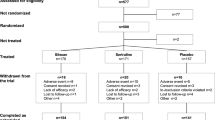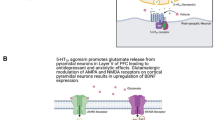Abstract
Recent studies have shown that selective serotonin reuptake inhibitors (SSRIs) have circadian properties, suggesting that the antidepressive action of SSRIs may also be attributable to circadian mechanisms. Another study reported an association between clock gene (CLOCK) and improvements in insomnia symptoms from SSRIs treatment. Therefore, we examined the association between CLOCK and the efficacy of fluvoxamine treatment in 121 patients with Japanese major depressive disorder (MDD). The MDD patients in this study had scores of 12 or higher on the 17 items of the Structured Interview Guide for Hamilton Rating Scale for Depression (SIGH-D). We defined a therapeutic response as a decrease of more than a 50% in baseline SIGH-D within 8 weeks, and clinical remission as a SIGH-D score of less than seven at 8 weeks. We selected three tagging SNPs in CLOCK for the subsequent statistical association analysis. We detected a significant association between rs3736544, a synonymous polymorphism in exon 20, and the fluvoxamine therapeutic response in MDD in the allele/genotype-wise analyses. In addition, remission with fluvoxamine was also significantly associated with rs3736544. These associations remained significant after Bonferroni correction. Moreover, haplotype analysis findings supported these significant associations, which appeared to be due mainly to rs3736544, in the fluvoxamine therapeutic remission. Our results indicate that CLOCK genotype may be a predictor of fluvoxamine treatment response in Japanese MDD. However, our sample size was small, and a replication study using larger samples may be required for conclusive results.
Similar content being viewed by others
References
Bailer, U., Wiesegger, G., Leisch, F., Fuchs, K., Leitner, I., Letmaier, M., et al. (2005). No association of clock gene T3111C polymorphism and affective disorders. European Neuropsychopharmacology, 15(1), 51–55. doi:10.1016/j.euroneuro.2004.05.004.
Barnard, A. R., & Nolan, P. M. (2008). When clocks go bad: Neurobehavioural consequences of disrupted circadian timing. PLoS Genetics, 4(5), e1000040. doi:10.1371/journal.pgen.1000040.
Benedetti, F., Serretti, A., Colombo, C., Barbini, B., Lorenzi, C., Campori, E., et al. (2003). Influence of CLOCK gene polymorphism on circadian mood fluctuation and illness recurrence in bipolar depression. American Journal of Medical Genetics. Part B, Neuropsychiatric Genetics, 123B(1), 23–26. doi:10.1002/ajmg.b.20038.
Desan, P. H., Oren, D. A., Malison, R., Price, L. H., Rosenbaum, J., Smoller, J., et al. (2000). Genetic polymorphism at the CLOCK gene locus and major depression. American Journal of Medical Genetics, 96(3), 418–421. doi:10.1002/1096-8628(20000612)96:3<418::AID-AJMG34>3.0.CO;2-S.
Dudbridge, F. (2003). Pedigree disequilibrium tests for multilocus haplotypes. Genetic Epidemiology, 25(2), 115–121. doi:10.1002/gepi.10252.
Gratacos, M., Soria, V., Urretavizcaya, M., Gonzalez, J. R., Crespo, J. M., Bayes, M., et al. (2008). A brain-derived neurotrophic factor (BDNF) haplotype is associated with antidepressant treatment outcome in mood disorders. The Pharmacogenomics Journal, 8(2), 101–112. doi:10.1038/sj.tpj.6500460.
Katzenberg, D., Young, T., Finn, L., Lin, L., King, D. P., Takahashi, J. S., et al. (1998). A CLOCK polymorphism associated with human diurnal preference. Sleep, 21(6), 569–576.
Kishi, T., Kitajima, T., Ikeda, M., Yamanouchi, Y., Kinoshita, Y., Kawashima, K., et al. (2008a). Association study of clock gene (CLOCK) and schizophrenia and mood disorders in the Japanese population. European archives of psychiatry and clinical neuroscience (in press).
Kishi, T., Kitajima, T., Ikeda, M., Yamanouchi, Y., Kinoshita, Y., Kawashima, K., et al. (2008b). Association analysis of nuclear receptor Rev-erb alpha gene (NR1D1) with mood disorders in the Japanese population. Neuroscience Research, 62(4), 211–215. doi:10.1016/j.neures.2008.08.008.
Mishima, K., Tozawa, T., Satoh, K., Saitoh, H., & Mishima, Y. (2005). The 3111T/C polymorphism of hClock is associated with evening preference and delayed sleep timing in a Japanese population sample. American Journal of Medical Genetics. Part B, Neuropsychiatric genetics, 133B(1), 101–104. doi:10.1002/ajmg.b.30110.
Monteleone, P., & Maj, M. (2008). The circadian basis of mood disorders: Recent developments and treatment implications. European Neuropsychopharmacology, 18(10), 701–711. doi:10.1016/j.euroneuro.2008.06.007.
Neale, B. M., & Sham, P. C. (2004). The future of association studies: Gene-based analysis and replication. American Journal of Human Genetics, 75(3), 353–362.
Peveler, R., & Kendrick, T. (2005). Selective serotonin reuptake inhibitors: THREAD trial may show way forward. BMJ, 330(7488), 420–421. doi:10.1136/bmj.330.7488.420-b.
Purcell, S., Cherny, S. S., & Sham, P. C. (2003). Genetic Power Calculator: Design of linkage and association genetic mapping studies of complex traits. Bioinformatics, 19(1), 149–150. doi:10.1093/bioinformatics/19.1.149.
Robilliard, D. L., Archer, S. N., Arendt, J., Lockley, S. W., Hack, L. M., English, J., et al. (2002). The 3111 Clock gene polymorphism is not associated with sleep and circadian rhythmicity in phenotypically characterized human subjects. Journal of Sleep Research, 11(4), 305–312. doi:10.1046/j.1365-2869.2002.00320.x.
Saito, S., Takahashi, N., Ishihara, R., Ikeda, M., Suzuki, T., Kitajima, T., et al. (2006). Association study between vesicle-associated membrane protein 2 gene polymorphisms and fluvoxamine response in Japanese major depressive patients. Neuropsychobiology, 54(4), 226–230. doi:10.1159/000100777.
Serretti, A., Benedetti, F., Mandelli, L., Lorenzi, C., Pirovano, A., Colombo, C., et al. (2003). Genetic dissection of psychopathological symptoms: Insomnia in mood disorders and CLOCK gene polymorphism. American Journal of Medical Genetics. Part B, Neuropsychiatric genetics, 121B(1), 35–38. doi:10.1002/ajmg.b.20053.
Serretti, A., Cusin, C., Benedetti, F., Mandelli, L., Pirovano, A., Zanardi, R., et al. (2005). Insomnia improvement during antidepressant treatment and CLOCK gene polymorphism. American Journal of Medical Genetics. Part B, Neuropsychiatric Genetics, 137B(1), 36–39. doi:10.1002/ajmg.b.30130.
Sprouse, J., Braselton, J., & Reynolds, L. (2006). Fluoxetine modulates the circadian biological clock via phase advances of suprachiasmatic nucleus neuronal firing. Biological Psychiatry, 60(8), 896–899. doi:10.1016/j.biopsych.2006.03.003.
Uz, T., Ahmed, R., Akhisaroglu, M., Kurtuncu, M., Imbesi, M., Dirim Arslan, A., et al. (2005). Effect of fluoxetine and cocaine on the expression of clock genes in the mouse hippocampus and striatum. Neuroscience, 134(4), 1309–1316. doi:10.1016/j.neuroscience.2005.05.003.
Acknowledgments
We thank Ms. M. Miyata and Ms. S. Ishihara for their technical support. This work was supported in part by research grants from the Japan Ministry of Education, Culture, Sports, Science and Technology, the Ministry of Health, Labor and Welfare, and the Health Sciences Foundation (Research on Health Sciences focusing on Drug Innovation).
Author information
Authors and Affiliations
Corresponding author
Additional information
Taro Kishi and Tsuyoshi Kitajima contributed equally to this work.
Rights and permissions
About this article
Cite this article
Kishi, T., Kitajima, T., Ikeda, M. et al. CLOCK may Predict the Response to Fluvoxamine Treatment in Japanese Major Depressive Disorder Patients. Neuromol Med 11, 53–57 (2009). https://doi.org/10.1007/s12017-009-8060-7
Received:
Accepted:
Published:
Issue Date:
DOI: https://doi.org/10.1007/s12017-009-8060-7




